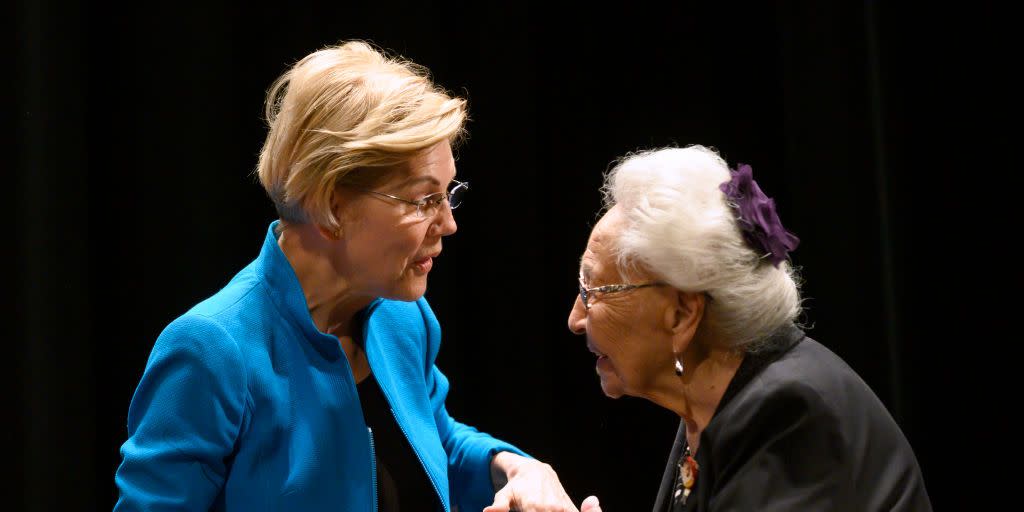Native Issues Are Finally Getting the Spotlight They Deserve on 2020 Campaigns

Frank LaMere was one of the strongest activists you never heard of. I met him during one of my reporting trips out to Nebraska regarding our old friend the Keystone XL pipeline, the continent-spanning death funnel and current conservative fetish object. We talked for a long time about the land and water that Frank believed would be destroyed by the pipeline, and about how ranchers had become allied with the Native people because it was their land being stolen by foreigners now. We also talked a lot about basketball, and about the Native players at various high schools around the state. (In his youth, Frank was a serious athlete.) One of Frank's other causes was to stop the sale of alcohol in the town of Whiteclay, which was just across the border from the Pine Ridge reservation in South Dakota. He was the national chairman of the Native caucus of the Democratic Party. Frank died of cancer in June.
In his honor, a presidential forum was held in Sioux Falls, Iowa. For reasons we need not repeat—I hope—Senator Professor Warren's appearance was considered to be significant. Frank LaMere had been a supporter of hers, even during the rough times. She addressed the hair-brained nonsense about her heritage right off the top, telling the story of the actual Pocahontas, who was kidnapped, raped, and married off to an Englishman and died when she was 21. But this is also what she told them.
Our stories are deeply woven into the fabric of who we are. The stories of immigrants and slaves, of explorers and refugees, have shaped and reshaped our country right up to the present day. For far too long, your story has been pushed aside, to be trotted out only in cartoons and commercials. So I’m here today to make a promise: Every time someone brings up my family’s story, I’m going to use it to lift up the story of your families and your communities. Your story is about contributions. The contributions you make to a country that took so much and keeps asking for more, contributions like serving in the military at rates higher than any other group in America.
It is a story about hope. The hope you create as more Native people go to college, go to graduate school and grow local economies. It is a story about resilience. The resilience you show as you reclaim your history and your traditions. And it is a story about pride and the determination of people who refuse to let their languages fade away and their cultures die. I honor that story. But there’s another story that also needs to be told. The story of our country’s mistreatment of your communities. And this isn’t just a story about casual racism – war whoops and tomahawk chops and insulting Facebook memes. It’s a story about discrimination and neglect — the unmet health care needs of Native children and families, the alarmingly high rate of suicide among Native teenagers, the growing opioid crisis and the broader epidemic of substance abuse that has ravaged so many Native communities.
It’s a story about greed. For generations — Congress after Congress, president after president — the government robbed you of your land, suppressed your languages, put your children in boarding schools and gave your babies away for adoption. It has stolen your resources and, for many tribal governments, taken away the opportunity to grow and prosper for the good of your people. Even today, politicians in Washington want to let their Big Oil buddies pad their profits by encroaching on your land and fouling your rivers and streams. Meanwhile, even as the economic future of your communities hangs in the balance, they want to cut nutrition assistance, cut Medicaid, and cut other programs that many Native families rely on to survive. It’s a story about violence. It is deeply offensive that this president keeps a portrait of Andrew Jackson hanging in the Oval Office, honoring a man who did his best to wipe out Native people. But the kind of violence President Jackson and his allies perpetrated isn’t just an ugly chapter in a history book. Violence remains part of life today. The majority of violent crimes experienced by Native Americans are perpetrated by non-Natives, and more than half — half — of Native women have experienced sexual violence. This must stop. And I promise I will fight to help write a different story.
It would be hard to quantify the extent to which the president*'s idiot slurs have pushed Native issues to the front of this presidential campaign, but it has to have had some effect.
Native issues are in the national spotlight more than they've been since Bobby Kennedy's campaign in 1968. First Julian Castro, and then SPW, have released detailed plans to address these issues. Over its two days, the LaMere Forum will draw nine of the Democratic contenders, and the national press corps that tags along with them. Those reporters will get to hear stories like the one told by Harold Frazier of the Cheyenne River Sioux Reservation about how the roads there were destroyed by historic flooding this spring and how the federal government still has not repaired them. There you have the climate crisis, the infrastructure crisis, and the historic neglect of our Native people, all connected in one way or the other. Frank LaMere would've explained it better.
Respond to this post on the Esquire Politics Facebook page here.
You Might Also Like

